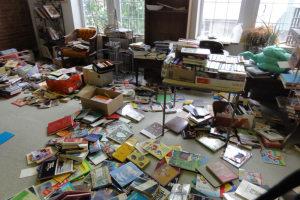My friend Adria Murphy writes for me this week, with thoughts on materialism, treasure, and the wisdom of Wendell Berry:
The jewelry store in my mother’s neighborhood was going out of business. Sale prices intended to empty the shop of its shining inventory, handwritten on construction paper, obstructed our view of the otherwise impeccably clean display cases. The contents of the cases were simple, classic, and costly. Sapphire stud earrings and delicate diamond tennis bracelets–tasteful, timelessly lovely pieces of art.
One of the owners, a silver-haired lady wearing high-waisted pants and a red wool vest, chatted with us as we admired an intricate filigree cross. Her husband helped another customer select a silver charm. I selected something small for my sister and waited for the woman to gift-wrap it in Christmas colors. My eyes wandered past the display cases to the jewel cleaning instruments in the back of the store, the table with the microscope, and the two cluttered desks covered in papers.
As we were leaving, a set of exquisite clocks caught our eye. On the hour, the clock faces broke into pieces and spun away from each other, revealing not only the shining gears underneath, but colorful dancing couples, fairies, and flowers spinning as the cogs turned. The clock played beautiful music, as well. We were mesmerized by the craftsmanship.
Something about this shop touched my heart. Perhaps it was the extravagant prices of the precious jewels. I could not imagine paying such prices for those pieces. I buy most of my jewelry from Target. I wear feathers, plastic, common metals, bits of glitter meant to imitate the shine of real jewels. I become bored with my jewelry, get rid of it, get new jewelry. I own very few pieces of real worth. I could buy thirty pairs of earrings from Target–big, shiny, chandelier earrings–for the price of one set of those little jewel studs. I probably own, or have owned, thirty pairs of earrings.
And that is what our culture prefers–what I suppose I’ve been raised to prefer–a rack full of worthless options, rather than the commitment of one small treasure. The store owners’ care and craft made me want to sell my many earrings, buy two tiny emeralds, and teach myself to rejoice in their value and beauty for the rest of my life. I pondered the little jewelry store as I drove down to Southern California, away from my family and back to my apartment and career. Every time I make this drive, I feel my soul squeezed as the trees and empty fields give way to shopping centers and skyscrapers.
I work in Irvine. I am grateful to Irvine for my employment, and for the dear, beautiful people I am privileged to know there. I have friends with beautiful homes, there, and their homes have souls. They have roots. Those homes have prayers in them, and families, and love.
But the city itself, I’m convinced, has no soul. I drive through neighborhoods of grand houses that all look alike. No architect loved them. No history shaped them. Some corporate machine spat them out.
Irvine is the ideal place to sell things. The town looks like my jewelry–made for mass production and choices. Made to be discarded at the arrival of something new and better.
I recently finished reading a novel by Wendell Berry. Wendell Berry is a farmer. He believes in land, and the importance of place. He believes in roots. He believes in home. Wendell Berry probably wouldn’t buy jewelry at all. But, if he did, he’d buy one costly jewel over a closet full of mass produced options. He’d commit to a treasure, and he’d pass it down from generation to generation. He’d love a thing because he owned it. He’d love it for its history, its roots.
Wendell Berry would say,
Ask the questions that have no answers.
Invest in the millennium. Plant sequoias.
Say that your main crop is the forest
that you did not plant,
that you will not live to harvest.
Living here is okay, right now. I love my job. Heaven help me, I love my students like family. But if I ever married, I think I would not live here. I would run away to some place with land. I’d put down roots, if it’s not too late, and I’d teach my children to put down roots, if it is. I’d buy them fewer things, so they have fewer things to throw away. I’d buy them fewer things, and I’d buy them treasures.
These are my complaints. Yet, this is where God has given me employment–a job I’m crazy about–and where I live with my dear friend, fumbling at our attempts to live as adults in this world that is too fast for us, searching for community and trying to open our lives to the people around us. Trying to live with our hands open.
Perhaps the answer to this longing isn’t to pick up and leave–to weary of these blessings and search for better options–but to stay and wait. And to know that my treasure isn’t here. When I long for land and greater skies and a place to call home, I am longing, really, for a Home I have never seen.




Leave a Reply
Your email is safe with us.